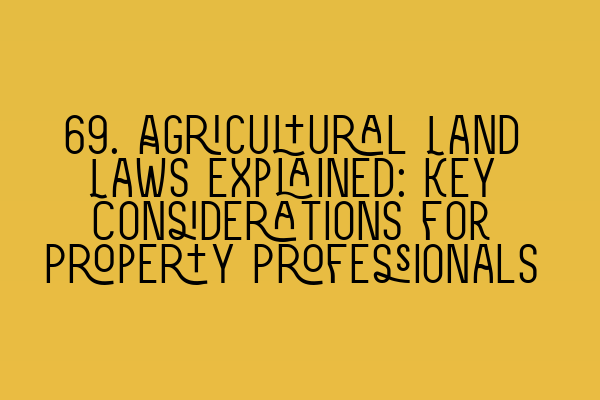69. Agricultural Land Laws Explained: Key Considerations for Property Professionals
Introduction
As a property professional, it is crucial to have a comprehensive understanding of agricultural land laws to effectively advise clients and navigate the complexities of the field. In this blog post, we will delve into the key considerations surrounding agricultural land laws, providing valuable insights and information to help you enhance your knowledge and expertise. Whether you are preparing for the SQE 1 or SQE 2 exams or simply seeking to expand your understanding in this area, this article will prove to be a valuable resource.
Understanding Agricultural Land Laws
Agricultural land is subject to various laws and regulations that differ in England, Wales, Scotland, and Northern Ireland. It is essential for property professionals to stay up to date with the specific statutes and rules governing agricultural land in the jurisdiction where they operate. Taking the time to develop a deep understanding of these laws will enable you to advise your clients accurately and effectively.
The 69 Act of 1695 and its Relevance Today
One of the essential pieces of legislation pertaining to agricultural land in England and Wales is the 69 Act of 1695. Despite its age, this Act remains pertinent today and plays a crucial role in determining the rights and responsibilities of landowners, tenants, and occupiers of agricultural land.
The 69 Act of 1695 sets out regulations concerning the transfer of agricultural land, leases, and other related matters. It addresses key issues such as rent, termination of tenancy, and dispute resolution in the agricultural context. Property professionals must familiarize themselves with the provisions of this Act to effectively navigate agricultural land transactions and provide appropriate advice to their clients.
Key Considerations for Property Professionals
Now that we have explored the importance of agricultural land laws and the 69 Act of 1695, let’s delve into some key considerations for property professionals:
1. Determine the Agricultural Status of the Land
Before proceeding with any transactions involving agricultural land, it is crucial to ascertain its agricultural status. The classification of land as agricultural determines the application of various laws and regulations, including taxation and planning permissions. Familiarize yourself with the criteria that define land as agricultural, such as its use for farming, forestry, or horticulture.
2. Investigate Tenancy Agreements and Rights
In many cases, agricultural land is subject to tenancy agreements and specific rights granted to tenants. As a property professional, it is vital to scrutinize these agreements and understand the rights and responsibilities of both landlords and tenants. This knowledge will enable you to provide informed advice to your clients and ensure compliance with relevant regulations.
3. Stay Updated with Changing Legislation
Agricultural land laws are not static and undergo periodic changes. It is imperative to stay informed about legislative updates and amendments that may impact your clients’ agricultural land transactions. Regularly check for announcements from governing bodies, attend relevant training sessions, and engage in continuing professional development to stay abreast of the latest developments in the field.
4. Familiarize Yourself with Agricultural Subsidies and Grants
Agricultural land is often eligible for various subsidies and grants provided by governmental bodies. Understanding the eligibility criteria, application processes, and associated regulations will allow you to assist your clients in accessing these financial incentives successfully. Keep track of key policy changes and ensure your advice aligns with the current agricultural subsidy framework.
5. Seek Specialist Advice when Needed
Given the complexity of agricultural land laws and the potential implications of non-compliance, property professionals should not hesitate to seek specialist advice when necessary. Collaborate with legal experts who specialize in agricultural land transactions to ensure your clients receive the most accurate and up-to-date guidance.
Conclusion
In conclusion, a thorough understanding of agricultural land laws is imperative for property professionals. The 69 Act of 1695 remains relevant today and holds significant importance in determining the rights and responsibilities of landowners, tenants, and occupiers of agricultural land. By considering key factors such as determining the agricultural status of the land, investigating tenancy agreements and rights, staying updated with changing legislation, familiarizing yourself with subsidies and grants, and seeking specialist advice when needed, property professionals can confidently navigate agricultural land transactions. Continuously expanding your knowledge and staying current with the developments in agricultural land laws will allow you to provide the best possible service to your clients.
For further resources and preparation for the SQE exams, check out these related articles:
– SQE 1 Practice Exam Questions
– SQE 1 Practice Mocks FLK1 FLK2
– SQE 2 Preparation Courses
– SQE 1 Preparation Courses
– SRA SQE Exam Dates
By staying informed and continually expanding your knowledge, you’ll be well-equipped to tackle any agricultural land law challenges that come your way.
